Publications related to Mental Models, Explanations, Visualizations: Promoting User-Centered Qualities in Recommender Systems
Mensch-Computer-Interaktion als zentrales Gebiet der Informatik: Bestandsaufnahme, Trends und Herausforderungen
Koch, M., Ziegler, J., Reuter, C., Schlegel, T., & Prilla, M. (2020). Informatik Spektrum, 43, 381–387.
Challenges in User-Centered Engineering of AI-based Interactive Systems
Ziegler, J. (2019). In B. Weyers & J. Bowen (Eds.), Joint Proceedings HCI Engineering 2019 – Methods and Tools for Advanced Interactive Systems and Integration of Multiple Stakeholder Viewpoints co-located with 11th ACM SIGCHI Symposium on Engineering Interactive Computing Systems (EICS 2019) (Vol. 2503, pp. 51–55).

How Users Ride the Carousel: Exploring the Design of Multi-List Recommender Interfaces From a User Perspective
Loepp, B., & Ziegler, J. (2023). RecSys ’23: Proceedings of the 17th ACM Conference on Recommender Systems.
ConvEx-DS: A Dataset for Conversational Explanations in Recommender Systems
Hernandez-Bocanegra, D. C., & Ziegler, J. (2021). Interfaces and Human Decision Making for Recommender Systems 2021: Proceedings of the 8th Joint Workshop on Interfaces and Human Decision Making for Recommender Systems, 2948, 3–20.
Identifying Group-Specific Mental Models of Recommender Systems: A Novel Quantitative Approach
Kunkel, J., Ngo, P. T., Ziegler, J., & Krämer, N. (2021). In C. Ardito, R. Lanzilotti, A. Malizia, H. Petrie, A. Piccinno, G. Desolda, & K. Inkpen (Eds.), Human-Computer Interaction – INTERACT 2021: Proceedings, Part IV (Vol. 12935, pp. 383–404). Springer.
Effects of Interactivity and Presentation on Review-Based Explanations for Recommendations
Hernandez Bocanegra, D. C., & Ziegler, J. (2021). In C. Ardito, R. Lanzilotti, A. Malizia, H. Petrie, A. Piccinno, G. Desolda, & K. Inkpen (Eds.), Human-Computer Interaction – INTERACT 2021: Proceedings, Part II (Vol. 12933, pp. 597–618). Springer.

Conversational Review-based Explanations for Recommender Systems: Exploring Users’ Query Behavior
Hernandez-Bocanegra, D. C., & Ziegler, J. (2021). CUI 2021 - 3rd Conference on Conversational User Interfaces.

Argumentative explanations for recommendations - Effect of display style and profile transparency
Hernandez Bocanegra, D. C., & Ziegler, J. (2020). In C. Hansen, A. Nürnberger, & B. Preim (Eds.), Mensch und Computer 2020.
An Interactive Hybrid Approach to Generate Explainable and Controllable Recommendations
Naveed, S. (2021). [PhD thesis, University of Duisburg-Essen].
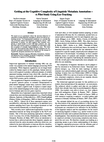
Getting at the Cognitive Complexity of Linguistic Metadata Annotation: A Pilot Study Using Eye-Tracking
Lohmann, S., Tomanek, K., Ziegler, J., & Hahn, U. (2010). In S. Ohlsson & R. Catrambone (Eds.), Proceedings of the 32nd Annual Meeting of the Cognitive Science Society (CogSci 2010). Cognitive Science Society.

A Cognitive Cost Model of Annotations Based on Eye-Tracking Data
Tomanek, K., Hahn, U., Lohmann, S., & Ziegler, J. (2010). In A. for C. Linguistics (Ed.), Proceedings of the 48th Annual Meeting of the Association for Computational Linguistics (ACL 2010). ACL.

E-Quest: Ein Online-Befragungswerkzeug für Web Usability
El Jerroudi, Z., Ziegler, J., Meissner, S., & Philipsenburg, A. (2005). In C. Stary (Ed.), Mensch & Computer 2005: Kunst und Wissenschaft - Grenzüberschreitungen der interaktiven ART. Oldenbourg Verlag.
Usability Engineering für web-basierte Applikationen
Bullinger, h.J., Heidmann, F., & Ziegler, J. (2002). It+Ti Informationstechnik Und Technische Informatik, 44(1), 5–13.
Intuitive Human-Computer Interaction - Towards a User-Friendly Information Society
Bullinger, H. J., Ziegler, J., & Bauer, W. (2002). International Journal of Human-Computer Interaction, 14(1), 1–23.
Usability Engineering für Web-basierte Applikationen
Bullinger, H. J., Heidmann, F., & Ziegler, J. (2001). It+Ti - Informationstechnik Und Technische Informatik.
Creativity support in system and process design
Wissen, M., & Ziegler, J. (2001). In G. Smith M. Salvendy (Ed.), Proceedings of the 9th Int. Conf. on Human-Computer Interaction (HCI International 2001), Vol. 2: Systems, Social and Internationalization Aspects of Human-Computer Interaction New Orleans, USA Aug. 5-10, 2001; Proceedings of the 9th Int. Conf. on Hu. Lawrence Erlbaum.
Can standards and guidelines promote Universal Access?
Ziegler, J. (2001). In C. Stephanidis (Ed.), Proceedings of the 9th Int. Conf. on Human-Computer Interaction (HCI International 2001), Vol. 3: Universal Access in HCI New Orleans, USA Aug. 5-10, 2001; Proceedings of the 9th Int. Conf. on Human-Computer Interaction (HCI International 2001), Vol. Lawrence Erlbaum.
Standards for multimedia user interfaces - opportunities and issues
Ziegler, J. (1999). In H. J. Bullinger & J. Ziegler (Eds.), Human-Computer Interaction - Communication, Cooperation and Application Design, Proceedings 8th Int. Conf. on Human-Computer Interaction, Vol. 2 Munich Aug. 22-26, 1999; Human-Computer Interaction - Communication, Cooperation and Application Design, Lawrence Erlbaum Associates.
Human-Computer Interaction: Ergonomics and User Interfaces
Bullinger, H.-J., & Ziegler, J. (1999). Vol. 1 of the Proceedings of the 8th International Conference on Human-Computer Interaction (HCI International ’99) Munich, Germany August 22-26, 1999; Vol. 1 of the Proceedings of the 8th International Conference on Human-Computer Interaction (HCI I.
Designing Effective and Usable Multimedia Systems
Sutcliffe, A. G., Ziegler, J., & Johnson, P. (1998).
Interactive Techniques
Ziegler, J. (1997). (A. B. J. Tucker, Ed.). CRC Press.
Prototyping als Vorgehenweise zur GUI-Entwicklung
Groh, G., Ziegler, J., & Fähnrich, K. P. (1996). (K. P. Fähnrich, C. Janssen, & G. Groh, Eds.). Oldenbourg.
Objektorientierter Entwurf graphischer Benutzungsschnittstellen
Janssen, C., & Ziegler, J. (1996). (K. P. Fähnrich, C. Janssen, & G. Groh, Eds.). Oldenbourg.
Benutzergerechte Software-Gestaltung
Ziegler, J., & Ilg, R. (1993). Oldenbourg.
The Dual Echo Chamber: Modeling Social Media Polarization for Interventional Recommending
Donkers, T., & Ziegler, J. (2021). Fifteenth ACM Conference on Recommender Systems, 12–22.
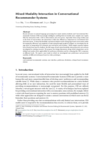
Mixed-Modality Interaction in Conversational Recommender Systems
Ma, Y., Kleemann, T., & Ziegler, J. (2021). Proceedings of the 8th Joint Workshop on Interfaces and Human Decision Making for Recommender Systems, 2948, 21–37.
Distribution sliders: Visualizing data distributions in range selection sliders
Kleemann, T., & Ziegler, J. (2020). Conference on "Mensch Und Computer", 67–78.

On the Use of Feature-based Collaborative Explanations: An Empirical Comparison of Explanation Styles
Naveed, S., Loepp, B., & Ziegler, J. (2020). ExUM ’20: Proceedings of the International Workshop on Transparent Personalization Methods Based on Heterogeneous Personal Data, 226–232.

Effects of Argumentative Explanation Types on the Perception of Review-Based Recommendations
Hernandez-Bocanegra, D. C., Donkers, T., & Ziegler, J. (2020). Adjunct Proceedings of the 28th ACM Conference on User Modeling, Adaptation and Personalization (UMAP ’20 Adjunct), 219–225.

Measuring the Impact of Recommender Systems – A Position Paper on Item Consumption in User Studies
Loepp, B., & Ziegler, J. (2019). Proceedings of the 1st Workshop on Impact of Recommender Systems (ImpactRS ’19).

How Can They Know That? A Study of Factors Affecting the Creepiness of Recommendations
Torkamaan, H., Barbu, C.-M., & Ziegler, J. (2019). In T. Bogers & A. Said (Eds.), Proceedings of the 13th ACM Conference on Recommender Systems (pp. 423–427). ACM.

The Influence of Trust Cues on the Trustworthiness of Online Reviews for Recommendations
Barbu, C.-M., Carbonell, G., & Ziegler, J. (2019). Proceedings of the 34th ACM/SIGAPP Symposium on Applied Computing, 1687–1689.

Co-Staying: a Social Network for Increasing the Trustworthiness of Hotel Recommendations
Barbu, C.-M., & Ziegler, J. (2017). In J. Neidhardt, D. Fesenmaier, T. Kuflik, & W. Wörndl (Eds.), RecTour 2017: 2nd Workshop on Recommenders in Tourism : Proceedings of the 2nd Workshop on Recommenders in Tourism co-located with 11th ACM Conference on Recommender Systems (RecSys 2017) Como, Italy, August 27, 2017 (Vol. 1906, pp. 35–39).

Users’ Choices About Hotel Booking: Cues for Personalizing the Presentation of Recommendations
Barbu, C.-M., & Ziegler, J. (2017). In T. Domonkos & P. Pu (Eds.), Poster Proceeding of ACM Recsys 2017: Proceedings of the Poster Track of the 11th ACM Conference on Recommender Systems (RecSys 2017) Como, Italy, August 28, 2017 (Vol. 1905, pp. 44–45).
Wahrnehmung und Akzeptanz von systemgenerierten Produktempfehlungen
Hussein, T., Gaulke, W., Hartmann, A., & Ziegler, J. (2010). In J. Ziegler & A. Schmidt (Eds.), Mensch & Computer 2010 (1st ed.). Oldenbourg.
Explaining Recommendations through Conversations: Dialog Model and the Effects of Interface Type and Degree of Interactivity
Hernandez-Bocanegra, D. C., & Ziegler, J. (2023). ACM Transactions on Interactive Intelligent Systems (TiiS), 13(2).
User-centered recommender systems
Ziegler, J., & Loepp, B. (2023). In M. Augstein, E. Herder, & W. Wörndl (Eds.), Personalized Human-Computer Interaction (2nd ed., pp. 33–58). De Gruyter Oldenbourg.
A comparative study of item space visualizations for recommender systems
Kunkel, J., & Ziegler, J. (2023). International Journal of Human Computer Studies, 172.
Recommendations as Challenges: Estimating Required Effort and User Ability for Health Behavior Change Recommendations
Torkamaan, H., & Ziegler, J. (2022). 27th International Conference on Intelligent User Interfaces, 106–119.
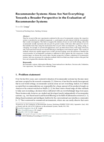
Recommender Systems Alone Are Not Everything: Towards a Broader Perspective in the Evaluation of Recommender Systems
Loepp, B. (2022). PERSPECTIVES ’22: Proceedings of the 2nd Workshop on Perspectives on the Evaluation of Recommender Systems.
Development of an Instrument for Measuring Users’ Perception of Transparency in Recommender Systems
Hellmann, M., Hernandez Bocanegra, D., & Ziegler, J. (2022). In A. Smith-Renner & O. Amir (Eds.), Workshops at the International Conference on Intelligent User Interfaces (IUI) 2022: Proceedings of the IUI 2022 Workshops: APEx-UI, HAI-GEN, HEALTHI, HUMANIZE, TExSS, SOCIALIZE (Vol. 3124, pp. 156–165). RWTH Aachen.

Explaining Review-Based Recommendations: Effects of Profile Transparency, Presentation Style and User Characteristics
Hernandez-Bocanegra, D. C., & Ziegler, J. (2020). i-Com: Journal of Interactive Media, 19(3), 181–200.
Empfehlungssysteme
Ziegler, J., & Loepp, B. (2020). In T. Kollmann (Ed.), Handbuch Digitale Wirtschaft (pp. 717–741). Springer Gabler.
Featuristic: An interactive hybrid system for generating explainable recommendations – Beyond system accuracy
Naveed, S., & Ziegler, J. (2020). Proceedings of the 7th Joint Workshop on Interfaces and Human Decision Making for Recommender Systems, 14–25.
Leveraging Arguments in User Reviews for Generating and Explaining Recommendations
Donkers, T., & Ziegler, J. (2020). Datenbank-Spektrum, 20(2), 181–187.
Explaining Recommendations by Means of Aspect-Based Transparent Memories
Donkers, T., Kleemann, T., & Ziegler, J. (2020). In F. Paternò & N. Oliver (Eds.), Proceedings of the 25th International Conference on Intelligent User Interfaces (pp. 166–176). The Association for Computing Machinery.

Integration of Dialog-based Product Advisors into Filter Systems
Kleemann, T., & Ziegler, J. (2019). Proceedings of the Conference on Mensch Und Computer, 67–77.

Feature-driven interactive recommendations and explanations with collaborative filtering approach
Naveed, S., & Ziegler, J. (2019). ComplexRec 2019: Proceedings of the Workshop on Recommendation in Complex Scenarios, 2449, 10–15.

To explain or not to explain: the effects of personal characteristics when explaining feature-based recommendations in different domains
Millecamp, M., Verbert, K., Naveed, S., & Ziegler, J. (2019). IntRS 2019: Proceedings of the 6th Joint Workshop on Interfaces and Human Decision Making for Recommender Systems, 2450, 10–18.

On User Awareness in Model-Based Collaborative Filtering Systems
Loepp, B., & Ziegler, J. (2017). Proceedings of the 1st Workshop on Awareness Interfaces and Interactions (AWARE ’17).
Hybreed: a software framework for developing context-aware hybrid recommender systems
Hussein, T., Linder, T., Gaulke, W., & Ziegler, J. (2014). User Modeling and User Adapted Interaction, 24(1), 121–174.
Ein Blick in die Wolken: Visuelle Exploration von Tag Clouds
Lohmann, S., Ziegler, J., & Tetzlaff, L. (2009). In H. Wandke, S. Kain, & D. Struve (Eds.), Mensch & Computer 2009. Oldenbourg.
Comparison of Tag Cloud Layouts: Task-Related Performance and Visual Exploration
Lohmann, S., Ziegler, J., & Tetzlaff, L. (2009). In T. Gross, J. Gulliksen, P. Kotzé, L. Oestreicher, P. Palanque, O. R. Prates, & M. Winkler (Eds.), Human-Computer Interaction - INTERACT 2009. Springer.
Automatische Generierung graphischer Benutzungsschnittstellen
Ziegler, J., Janssen, C., & Weisbecker, A. (1996). Werkzeuge Zur Entwicklung Graphischer Benuterschrittstellen; Werkzeuge Zur Entwicklung Graphischer Benuterschrittstellen.

Modeling User Interaction at the Convergence of Filtering Mechanisms, Recommender Algorithms and Advisory Components
Kleemann, T., Wagner, M., Loepp, B., & Ziegler, J. (2021). Mensch Und Computer 2021 – Tagungsband, 531–543.
Impact of Consuming Suggested Items on the Assessment of Recommendations in User Studies on Recommender Systems
Loepp, B., Donkers, T., Kleemann, T., & Ziegler, J. (2019). Proceedings of the 28th International Joint Conference on Artificial Intelligence (IJCAI ’19), 6201–6205.

Let Me Explain: Impact of Personal and Impersonal Explanations on Trust in Recommender Systems
Kunkel, J., Donkers, T., Michael, L., Barbu, C.-M., & Ziegler, J. (2019). Proceedings of the 37th International Conference on Human Factors in Computing Systems (CHI ’19), 487:1–487:12.

Impact of Item Consumption on Assessment of Recommendations in User Studies
Loepp, B., Donkers, T., Kleemann, T., & Ziegler, J. (2018). Proceedings of the 12th ACM Conference on Recommender Systems (RecSys ’18), 49–53.
Blending Conversational Product Advisors and Faceted Filtering in a Graph-Based Approach
Kleemann, T., & Ziegler, J. (2023). In J. Abdelnour Nocera, Kristı́n Lárusdóttir Marta, H. Petrie, A. Piccinno, & M. Winckler (Eds.), Human-Computer Interaction – INTERACT 2023 : 19th IFIP TC13 International Conference, York, UK, August 28 – September 1, 2023, Proceedings, Part III (Vol. 14144, pp. 137–159). Springer Nature Switzerland.
Creating Omni-Channel In-Store Shopping Experiences through Augmented-Reality-Based Product Recommending and Comparison
Álvarez Márquez, J. O., & Ziegler, J. (2023). International Journal of Human–Computer Interaction, in press.

Towards Multi-Method Support for Product Search and Recommending
Kleemann, T., Loepp, B., & Ziegler, J. (2022). Adjunct Proceedings of the 30th ACM Conference on User Modeling, Adaptation and Personalization (UMAP ’22), 74–79.
Health Recommender Systems for Mental Health Promotion
Torkamaan, H. (2022). [PhD thesis, University of Duisburg-Essen].
Argumentative Explanations for Recommendations Based on Reviews
Hernandez Bocanegra, D. C. (2022). [PhD thesis, University of Duisburg-Essen].
Integrating Behavior Change and Persuasive Design Theories into an Example Mobile Health Recommender System
Torkamaan, H., & Ziegler, J. (2021). UbiComp ’21: Adjunct Proceedings of the 2021 ACM International Joint Conference on Pervasive and Ubiquitous Computing and Proceedings of the 2021 ACM International Symposium on Wearable Computers, 218–225.
Acceptance of an AR-Based In-Store Shopping Advisor: The Impact of Psychological User Characteristics
Álvarez Márquez, J. O., & Ziegler, J. (2021). In C. Ardito, R. Lanzilotti, A. Malizia, H. Petrie, A. Piccinno, G. Desolda, & K. Inkpen (Eds.), Human-Computer Interaction – INTERACT 2021: Proceedings, Part I (Vol. 12932, pp. 457–479). Springer.

NewsViz: Depicting and Controlling Preference Profiles Using Interactive Treemaps in News Recommender Systems
Kunkel, J., Schwenger, C., & Ziegler, J. (2020). UMAP 2020 - Proceedings of the 28th ACM Conference on User Modeling, Adaptation and Personalization, 126–135.

Exploring Mental Models for Transparent and Controllable Recommender Systems: A Qualitative Study
Ngo, T. P., Kunkel, J., & Ziegler, J. (2020). UMAP 2020 - Proceedings of the 28th ACM Conference on User Modeling, Adaptation and Personalization, 183–191.

Towards Interactive Recommending in Model-based Collaborative Filtering Systems
Loepp, B., & Ziegler, J. (2019). Proceedings of the 13th ACM Conference on Recommender Systems (RecSys ’19), 546–547.

The impact of emotionality and trust cues on the perceived trustworthiness of online reviews
Carbonell, G., Barbu, C.-M., Vorgerd, L., & Brand, M. (2019). Cogent Business and Management, 6(1), 1586062.
Multi-criteria rating-based preference elicitation in health recommender systems
Torkamaan, H., & Ziegler, J. (2018). Proceedings of the Third International Workshop on Health Recommender Systems Co-Located with Twelfth ACM Conference on Recommender Systems (HealthRecSys’18), 2216, 18–23.
Augmented Reality Based Recommending in the Physical World
Álvarez Márquez, J. O., & Ziegler, J. (2018). In R. Dachselt & G. Weber (Eds.), Mensch und Computer 2018 - Workshopband (pp. 285–291). Gesellschaft für Informatik e.V.

Argumentation-based explanations in recommender systems: Conceptual framework and empirical results
Naveed, S., Donkers, T., & Ziegler, J. (2018). UMAP 2018 - Adjunct Publication of the 26th Conference on User Modeling, Adaptation and Personalization, 293–298.

Explaining Recommendations by Means of User Reviews
Donkers, T., Loepp, B., & Ziegler, J. (2018). Proceedings of the 1st Workshop on Explainable Smart Systems (ExSS ’18).

Negotiation and Reconciliation of Preferences in a Group Recommender System
Álvarez Márquez, J. O., & Ziegler, J. (2018). Journal of Information Processing, 26, 186–200.
Improving the Shopping Experience with an Augmented Reality-Enhanced Shelf
Álvarez Márquez, J. O., & Ziegler, J. (2017). Mensch Und Computer 2017 - Workshopband, 629–632.

Towards a Design Space for Personalizing the Presentation of Recommendations
Barbu, C.-M., & Ziegler, J. (2017). In L. Boratto, S. Carta, & G. Fenu (Eds.), EnCHIReS 2017: Engineering Computer-Human Interaction in Recommender Systems : Proceedings of the Second Workshop on Engineering Computer-Human Interaction in Recommender Systems co-located with the 9th ACM SIGCHI Symposium on Engineering Interactive Computing Systems (EICS 2017) (Vol. 1945, pp. 10–17).

Sequential User-based Recurrent Neural Network Recommendations
Donkers, T., Loepp, B., & Ziegler, J. (2017). Proceedings of the 11th ACM Conference on Recommender Systems (RecSys ’17), 152–160.

User Model Dimensions for Personalizing the Presentation of Recommendations
Barbu, C.-M., & Ziegler, J. (2017). In P. Brusilovsky, M. de Gemmis, A. Felfernig, P. Lops, J. O’Donovan, N. Tintarev, & C. M. Willemsen (Eds.), IntRS 2017: Interfaces and Human Decision Making for Recommender Systems : Proceedings of the 4th Joint Workshop on Interfaces and Human Decision Making for Recommender Systems co-located with ACM Conference on Recommender Systems (RecSys 2017) (Vol. 1884, pp. 20–23).
Hootle+: A Group Recommender System Supporting Preference Negotiation
Álvarez Márquez, J. O., & Ziegler, J. (2016). In T. Yuizono, H. Ogata, U. H. Hoppe, & J. Vassileva (Eds.), Collaboration and Technology: 22nd International Conference, CRIWG 2016, Kanazawa, Japan, September 14-16, 2016, Proceedings (Vol. 9848, pp. 151–166). Springer.

Interactive Recommending: Framework, State of Research and Future Challenges
Loepp, B., Barbu, C.-M., & Ziegler, J. (2016). Proceedings of the 1st Workshop on Engineering Computer-Human Interaction in Recommender Systems (EnCHIReS ’16), 3–13.
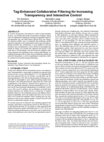
Tag-Enhanced Collaborative Filtering for Increasing Transparency and Interactive Control
Donkers, T., Loepp, B., & Ziegler, J. (2016). Proceedings of the 24th Conference on User Modeling Adaptation and Personalization (UMAP ’16), 169–173.
Preference Elicitation and Negotiation in a Group Recommender System
Álvarez Márquez, J. O., & Ziegler, J. (2015). In J. Abascal, S. Barbosa, M. Fetter, T. Gross, P. Palanque, & M. Winckler (Eds.), Human-Computer Interaction – INTERACT 2015: 15th IFIP TC 13 International Conference, Bamberg, Germany, September 14-18, 2015, Proceedings, Part II. Springer International Publishing.
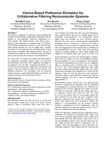
Choice-based Preference Elicitation for Collaborative Filtering Recommender Systems
Loepp, B., Hussein, T., & Ziegler, J. (2014). Proceedings of the 32nd International Conference on Human Factors in Computing Systems (CHI ’14), 3085–3094.
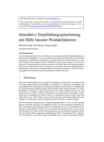
Interaktive Empfehlungsgenerierung mit Hilfe latenter Produktfaktoren
Loepp, B., Hussein, T., & Ziegler, J. (2013). Mensch & Computer 2013 – Tagungsband, 17–26.
Kontextadaptive Unterstützung bei der Auswahl effektiver Aktivitätsziele
Herrmanny, K. (2025). [PhD thesis].
De-centering the (Traditional) User: Multistakeholder Evaluation of Recommender Systems
Burke, R., Adomavicius, G., Bogers, T., Di Noia, T., Kowald, D., Neidhardt, J., Özgöbek, Ö., Pera, M. S., Tintarev, N., & Ziegler, J. (2025). International Journal of Human Computer Studies, 203.
De-centering the (Traditional) User: Multistakeholder Evaluation of Recommender Systems
Burke, R., Adomavicius, G., Bogers, T., Di Noia, T., Kowald, D., Neidhardt, J., Özgöbek, Ö., Pera, M. S., Tintarev, N., & Ziegler, J. (2025). International Journal of Human Computer Studies, 203.
7th Workshop on Explainable User Models and Personalised Systems (ExUM 2025)
Musto, C., Polignano, M., Rapp, A., Semeraro, G., & Ziegler, J. (2025). In Association for Computing Machinery (Ed.), UMAP Adjunct ’25: Adjunct Proceedings of the 33rd ACM Conference on User Modeling, Adaptation and Personalization (pp. 174–176). Association for Computing Machinery, Inc.
Challenges in Integrating Conversational AI and GUI-Based Applications
Ziegler, J. (2025). In L. Zaina, J. Creissac Campos, & D. Spano (Eds.), Engineering Interactive Computer Systems: EICS 2024 International Workshops; Revised Selected Papers (Vol. 15518, pp. 159–170). Springer Science and Business Media Deutschland GmbH.
Knowledge Graph-Based Integration of Conversational Advisors and Faceted Filtering
Kleemann, T., Loepp, B., & Ziegler, J. (2025). Interacting with Computers, 37(3), 158–188.
De-centering the (Traditional) User: Multistakeholder Evaluation of Recommender Systems
Burke, R., Adomavicius, G., Bogers, T., Di Noia, T., Kowald, D., Neidhardt, J., Özgöbek, Ö., Soledad Pera, M., Tintarev, N., & Ziegler, J. (2025).
Preface to the special issue on news personalization and analytics
Kille, B., Lommatzsch, A., Ziegler, J., & Özgöbek, Ö. (2024). User Modeling and User-Adapted Interaction, in press.
Knowledge Graph-Based Integration of Conversational Advisors and Faceted Filtering
Kleemann, T., Loepp, B., & Ziegler, J. (2024). Interacting with Computers, in press.
Assessing the Utility of an Interaction Qualities Framework in Systematizing the Evaluation of User Control
Smits, A., Detweiler, C., Bartels, E., Pott, K., van der Stappen, E., van Rossen, S., Cardona, K., Shayan, S., Ziegler, J., & van Turhout, K. (2024). In A. Bramwell-Dicks, A. Evans, M. Winckler, H. Petrie, & J. Abdelnour-Nocera (Eds.), Design for Equality and Justice: INTERACT 2023 IFIP TC 13 Workshops, York, UK, August 28 – September 1, 2023, Revised Selected Papers, Part II (pp. 185–195). Springer.
Exploring Categorizations of Algorithmic Affordances in Graphical User Interfaces of Recommender Systems
Bartels, E., Smits, A., Detweiler, C., van der Stappen, E., van Rossen, S., Shayan, S., Pott, K., Cardona, K., Ziegler, J., & van Turnhout, K. (2024). In A. Bramwell-Dicks, A. Evans, M. Winckler, H. Petrie, & J. Abdelnour-Nocera (Eds.), Design for Equality and Justice: Revised Selected Papers, Part II (Vol. 14536, pp. 173–184). Springer.
Design Ideas for Recommender Systems in Flexible Education: How Algorithmic Affordances May Address Ethical Concerns
van Rossen, S., Bartels, E., Cardona, K., Detweiler, C., Pott, K., Shayan, S., Smits, A., Ziegler, J., & van der Stappen, E. (2024). In A. Bramwell-Dicks, A. Evans, M. Winckler, H. Petrie, & J. Abdelnour-Nocera (Eds.), Design for Equality and Justice: Revised Selected Papers, Part II (Vol. 14536, pp. 205–213). Springer.
ExUM 2024 - 6th Workshop on Explainable User Modeling and Personalised Systems
Polignano, M., Musto, C., Delić, A., Inel, O., Rapp, A., Semeraro, G., & Ziegler, J. (2024). In The Association for Computing Machinery (ACM) (Ed.), Adjunct Proceedings of the 32nd ACM Conference on User Modeling, Adaptation and Personalization (UMAP Adjunct ’24) (pp. 236–239). ACM.
Exploring the Potential of Generative AI for Augmenting Choice-Based Preference Elicitation in Recommender Systems
Loepp, B., & Ziegler, J. (2024). In The Association for Computing Machinery (ACM) (Ed.), Adjunct Proceedings of the 32nd ACM Conference on User Modeling, Adaptation and Personalization (UMAP Adjunct ’24) (pp. 114–119). ACM.
Second Workshop on Engineering Interactive Systems Embedding AI Technologies
Dix, A., Luyten, K., Mayer, S., Palanque, P., Panizzi, E., Spano, L. D., & Ziegler, J. (2024). In M. Nebeling, L. D. Spano, & J. C. Campos (Eds.), EICS ’24 Companion: Companion Proceedings of the 16th ACM SIGCHI Symposium on Engineering Interactive Computing Systems (pp. 103–107). Association for Computing Machinery.
Exploring the Potential of Generative AI for Augmenting Choice-Based Preference Elicitation in Recommender Systems
Loepp, B., & Ziegler, J. (2024). UMAP Adjunct ’24: Adjunct Proceedings of the 32nd ACM Conference on User Modeling, Adaptation and Personalization, 114–119.
A Multi-perspective Panel on User-Centred Transparency, Explainability, and Controllability in Automations
Palanque, P., Paternò, F., Roto, V., Schmidt, A., Stumpf, S., & Ziegler, J. (2023). In J. A. Nocera, Lárusdóttir Marta Kristı́n, H. Petrie, A. Piccinno, & M. Winckler (Eds.), Human-Computer Interaction – INTERACT 2023: Proceedings (Vol. 14145, pp. 349–353). Springer Science and Business Media Deutschland GmbH.
Interactive Recommendation Systems
Ziegler, J., & Loepp, B. (2023). In J. Vanderdonckt, P. Palanque, & M. Winckler (Eds.), Handbook of Human Computer Interaction (pp. 1–29). Springer.
Initiative transfer in conversational recommender systems
Ma, Y., & Ziegler, J. (2023). In J. Zhang & L. Chen (Eds.), Proceedings of the 17th ACM Conference on Recommender Systems, RecSys 2023 (pp. 978–984). Association for Computing Machinery, Inc.
5th Workshop on Explainable User Models and Personalised Systems (ExUM)
Musto, C., Delic, A., Inel, O., Polignano, M., Rapp, A., Semeraro, G., & Ziegler, J. (2023). In The Association for Computing Machinery (Ed.), UMAP 2023: Adjunct Proceedings of the 31st ACM Conference on User Modeling, Adaptation and Personalization ; 26-30 June, 2023, Limassol, Cyprus (pp. 196–198). Association for Computing Machinery.
An Instrument for measuring users’ meta-intents
Ma, Y., Donkers, T., Kleemann, T., & Ziegler, J. (2023). In J. Gwizdka & S. Y. Rieh (Eds.), CHIIR ’23: Proceedings of the 2023 Conference on Human Information Interaction and Retrieval (pp. 290–302). ACM.
Decision-Making Support in Complex Multi-Actor and Multi-Source Scenarios
Álvarez Márquez, J. O. (2022). [PhD thesis].

On the Convergence of Intelligent Decision Aids
Loepp, B. (2021). Mensch Und Computer 2021 – Workshopband.
Interactive Methods for Model-based Collaborative Filtering Recommender Systems
Loepp, B. (2021). [PhD thesis, University of Duisburg-Essen].

In-Store Augmented Reality-Enabled Product Comparison and Recommendation
Álvarez Márquez, J. O., & Ziegler, J. (2020). 14th ACM Conference on Recommender Systems, 180–189.

Kartenbasierte Produktraumdarstellung zur Erhöhung von Transparenz und Steuerbarkeit in Empfehlungssystemen
Kunkel, J., Feldkamp, T., & Ziegler, J. (2019). Mensch Und Computer 2019: Tagungsband.

Augmented-Reality-Enhanced Product Comparison in Physical Retailing
Álvarez Márquez, J. O., & Ziegler, J. (2019). Mensch Und Computer 2019: Tagungsband, 55–65.

LittleMissFits: Ein Game-With-A-Purpose zur Evaluierung subjektiver Verständlichkeit von latenten Faktoren in Empfehlungssystemen
Kunkel, J., Loepp, B., Dolff, E., & Ziegler, J. (2019). Mensch Und Computer 2019 – Workshopband, 49–56.

Visualizing Item Spaces to Increase Transparency and Control in Recommender Systems
Kunkel, J., & Ziegler, J. (2019). AI and HCI Workshop at CHI’19.

Designing Interactive Visualizations of Personalized Review Data for a Hotel Recommender System
Barbu, C.-M., & Ziegler, J. (2018). In J. Neidhardt, W. Wörndl, T. Kuflik, & M. Zanker (Eds.), RecTour 2018: 3rd Workshop on Recommenders in Tourism co-located with the 12th ACM Conference on Recommender Systems (RecSys 2018) (Vol. 2222, pp. 7–12). RWTH.

Recommending Running Routes: Framework and Demonstrator
Loepp, B., & Ziegler, J. (2018). Proceedings of the 2nd Second Workshop on Recommendation in Complex Scenarios (ComplexRec ’18), 26–29.
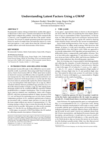
Understanding Latent Factors Using a GWAP
Kunkel, J., Loepp, B., & Ziegler, J. (2018). Proceedings of the Late-Breaking Results Track Part of the Twelfth ACM Conference on Recommender Systems (RecSys ’18).

Ein Online-Spiel zur Benennung latenter Faktoren in Empfehlungssystemen
Kunkel, J., Loepp, B., & Ziegler, J. (2018). Mensch Und Computer 2018 – Tagungsband.
A Framework for Analyzing and Calibrating Trust in Automated Vehicles
Mirnig, G. A., Wintersberger, P., Sutter, C., & Ziegler, J. (2016). In P. Green (Ed.), Adjunct Proceedings of the 8th International Conference on Automotive User Interfaces and Interactive Vehicular Applications (pp. 33–38). ACM.

Towards Understanding Latent Factors and User Profiles by Enhancing Matrix Factorization with Tags
Donkers, T., Loepp, B., & Ziegler, J. (2016). Poster Proceedings of the 10th ACM Conference on Recommender Systems (RecSys ’16).
Welcome to EICS 2015
Ziegler, J., Nebeling, M., Nigay, L., Campos, J., & Winckler, M. (2015). In J. Ziegler (Ed.), Proceedings of the 7th ACM SIGCHI Symposium on Engineering Interactive Computing Systems (pp. v–vi). Association for Computing Machinery, Inc.

Merging Latent Factors and Tags to Increase Interactive Control of Recommendations
Donkers, T., Loepp, B., & Ziegler, J. (2015). Poster Proceedings of the 9th ACM Conference on Recommender Systems (RecSys ’15).
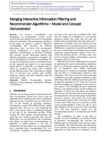
Merging Interactive Information Filtering and Recommender Algorithms: Model and Concept Demonstrator
Loepp, B., Herrmanny, K., & Ziegler, J. (2015). i-Com, 14(1), 5–17.

Blended Recommending: Integrating Interactive Information Filtering and Algorithmic Recommender Techniques
Loepp, B., Herrmanny, K., & Ziegler, J. (2015). Proceedings of the 33rd International Conference on Human Factors in Computing Systems (CHI ’15), 975–984.
A conceptual model and a software framework for developing context aware hybrid recommender systems
Hussein, T. (2013). Hut.
A Context-Aware Shopping Portal Based on Semantic Models
Hussein, T., Linder, T., & Ziegler, J. (2013). In T. Hussein, H. Paulheim, S. Lukosch, J. Ziegler, & G. Calvary (Eds.), Semantic Models for Adaptive Interactive Systems. Springer.
Normal Users Cooperating on Process Models: Is It Possible at All?
Nolte, A., & Prilla, M. (2012). In V. Herskovic, H. U. Hoppe, J. Ziegler, & M. Jansen (Eds.), Collaboration and Technology: Proceedings (Vol. 7493, pp. 57–72). Springer.
Supporting social tasks of individuals: A matter of access to cooperation systems
Prilla, M. (2012). In V. Herskovic, H. U. Hoppe, J. Ziegler, & M. Jansen (Eds.), Collaboration and Technology (CRIWG 2012): Proceedings (Vol. 7493, pp. 89–96). Springer.
Matchballs – A multi-agent-system for ontology-based collaborative learning games
Ziebarth, S., Malzahn, N., & Hoppe, U. H. (2012). In V. Herskovic, U. H. Hoppe, M. Jansen, & J. Ziegler (Eds.), Collaboration and Technology: Proceedings (Vol. 7493, pp. 208–222). Springer Berlin Heidelberg.
Formal modeling of multi-user interfaces in cooperative work
Weyers, B., Luther, W., Baloian, N., & Pino, A. J. (2012). In V. Herskovic, U. H. Hoppe, M. Jansen, & J. Ziegler (Eds.), Collaboration and Technology: Proceedings (Vol. 7493, pp. 129–136). Springer Berlin Heidelberg.
Enabling and Evaluating Mobile Learning Scenarios with Multiple Input Channels
Bollen, L., Eimler, C. S., Jansen, M., & Engler, J. (2012). In V. Herskovic, U. H. Hoppe, M. Jansen, & J. Ziegler (Eds.), Collaboration and Technology: Proceedings (Vol. 7493, pp. 161–175). Springer Berlin Heidelberg.
3rd Workshop on Semantic Models for Adaptive Interactive Systems (SEMAIS)
Hussein, T., Lukosch, S., Paulheim, H., Ziegler, J., & Calvary, G. (2012). IUI 2012: Proceedings of the 17th International Conference on Intelligent User Interfaces, 401–403.
Zukünftige Entwicklungen in der Mobilität : betriebswirtschaftliche und technische Aspekte ; [... Beiträge des 3. Wissenschaftsforums Mobilität, das im Juli 2011 an der Universität Duisburg-Essen stattfand]
Proff, H., Schönharting, J., Schramm, D., & Ziegler, J. (2012). Gabler.
Training conflict management in a collaborative virtual environment
Emmerich, K., Neuwald, K., Othlinghaus, J., Ziebarth, S., & Hoppe, U. H. (2012). In J. Ziegler, M. Jansen, U. H. Hoppe, & V. Herskovic (Eds.), Collaboration and Technology: 18th International Conference, CRIWG 2012 Raesfeld, Germany, September 16-19, 2012 Proceedings (Vol. 7493, pp. 17–32). Springer.
Collaboration and Technology: 18th International Conference, CRIWG 2012 Raesfeld, Germany, September 16-19, 2012 Proceedings
18th International Conference, CRIWG 2012 Raesfeld, Germany, September 16-19, 2012. (2012). (J. Ziegler, M. Jansen, U. H. Hoppe, & V. Herskovic, Eds.; Vol. 7493). Springer.
Faceted Visual Exploration of Semantic Data
Heim, P., & Ziegler, J. (2011). In A. Ebert (Ed.), Human Aspects of Visualization: Revised Selected Papers (Vol. 6431, pp. 58–75). Springer Berlin Heidelberg.
Semantic web meets UI: Context-adaptive interaction with semantic data
Ziegler, J. (2011). In A. Dittmar (Ed.), Proceedings of the 29th Annual European Conference on Cognitive Ergonomics (pp. 15–16). ACM Press.
Context-adaptive interaction for collaborative work
Ziegler, J., Haake, M. J., Lukosch, S., & Pipek, V. (2010). CHI 2010 - We Are HCI: Conference Proceedings and Extended Abstracts, 4461–4464.
Group context-based adaptations for recommendation
Joop, B., & Ziegler, J. (2010). Proceedings of the 1st International Workshop on Semantic Models for Adaptive Interactive Systems, 11–15.
Facet Graphs: Complex Semantic Querying Made Easy
Heim, P., Ertl, T., & Ziegler, J. (2010). The Semantic Web: Research and Applications; Proccedings Part I, 288–302.

Adapting web sites by spreading activation in ontologies
Hussein, T., & Ziegler, J. (2008). ReColl ’08: Int. Workshop on Recommendation and Collaboration (in Conjunction with IUI 2008).
Interaktion mit komplexen Informationsräumen: Visualisierung, Multimodalität, Kooperation
Ziegler, J., & Beinhauer, W. (Eds.). (2007). Oldenbourg.

Automatische Themenextraktion aus gesprochener Sprache
Ziegler, J., El Jerroudi, Z., Böhm, C., Beinhauer, W., & Räther, C. (2004). In R. Keil-Slawik, H. Selke, & G. Szwillus (Eds.), Mensch & Computer 2004: Allgegenwärtige Interaktion. Oldenbourg Verlag.
Echtzeit-Visualisierungs-Editor fuer deskriptive Verhaltensprotokolle
Piesk, J., Heeg, R., Hoenscheid, R., Krämer, N., & Bente, G. (2003). In G. Szwillus & J. Ziegler (Eds.), Mensch & Computer 2003: Interaktion in Bewegung; [Tagungsbeiträge der dritten Konferenz Mensch & Computer 2003 in Stuttgart] (1. Auflage, Vol. 57, pp. 177–186). Teubner.
Brauchen Interface-Agenten Emotionen
Krämer, N., & Bente, G. (2003). In J. Ziegler & G. Szwillus (Eds.), Mensch & Computer 2003: Interaktion in Bewegung; [Tagungsbeiträge der dritten Konferenz Mensch & Computer 2003 in Stuttgart] (1. Aufl., Vol. 57, pp. 287–296). Teubner.
Vorwort
Ziegler, J. (2003). In J. Ziegler & G. Szwillus (Eds.), Mensch & Computer 2003: Interaktion in Bewegung; [Tagungsbeiträge der dritten Konferenz Mensch & Computer 2003 in Stuttgart] (1. Auflage, Vol. 57, pp. 13–14). Teubner.
Mensch Computer 2003 - Interaktion in Bewegung; Tagungsband der dritten Konferenz Mensch Computer 2003 in Stuttgart
Ziegler, J., & Szwillus, G. (2003).
Managing human-computer interaction and emerging issues
Bullinger, H. J., & Ziegler, J. (2003). (J. A. Jacko, Ed.). Erlbaum.
Intuitive interaction in complex informaiton spaces - Results and exploitation of INVITE
Beinhauer, W., & Ziegler, J. (2003). 2nd International Status Conference Human-Technology Interaction (German Ministry of Education and Research).
Mensch Computer 2003 - Interaktion in Bewegung; Tagungsband der dritten Konferenz Mensch Computer 2003
Ziegler, J., & Szwillus, G. (2003). Teubner.
Modeling Cooperative Work Processes - A Multiple Perspectives Framework
Ziegler, J. (2002). International Journal of Human-Computer Interaction, 14(2), 139–157.
Matrix Browser as a New Interactive Visualization for Large Networked Information Spaces
Ziegler, J., Kunz, C., Botsch, V., & Schneeberger, J. (2002). UIST 2002, ACM Conf. User Interface Software Paris, France Oct. 2002; UIST 2002, ACM Conf. User Interface Software Paris, France Oct. 2002.
Simulating recognition errors in speech user interface prototyping
Peissner, M., Heidmann, F., & Ziegler, J. (2001). In D. S. G. H. Smith M. & R. Koubek (Eds.), Proceedings of the 9th Int. Conf. on Human-Computer Interaction (HCI International 2001), Vol. 1: Cognitive Engineering, Intelligent Agents and Virtual Reality New Orleans, USA Aug. 5-10, 2001; Proceedings of the 9th Int. Conf. on Human-Computer Inte. Lawrence Erlbaum.
Realisierung einer laserbasierten Interaktionstechnik für Projektionswände
Wissen, M., Wischy, M., & Ziegler, J. (2001). Tagung Mensch Computer 2001; Tagung Mensch Computer 2001.
Intuitive human-computer interaction for a networked information world (INVITE) - Research approaches and results
Ziegler, J. (2001). International Status Conference Lead Projects Human-Computer Interaction Saarbrücken Oct. 26-27, 2001.
Entwicklungstrends im Bereich Human-Computer Interaction
Bullinger, H. J., Rathke, C., & Ziegler, J. (2000). In R. Reichwald & M. Kreis (Eds.), Anwenderfreundliche Kommunikationssysteme : Referate des Kongresses Anwenderfreundliche Kommunikationssysteme vom 16. und 17. Juni 1999; Anwenderfreundliche Kommunikationssysteme : Referate des Kongresses Anwenderfreundliche Kommunikationssysteme vom. Hüthig.
Human-Computer Interaction: Communication, Cooperation, and Application Design
Bullinger, H.-J., & Ziegler, J. (1999). Vol. 1 of the Proceedings of the 8th International Conference on Human-Computer Interaction (HCI International ’99) Munich, Germany August 22-26, 1999; Vol. 1 of the Proceedings of the 8th International Conference on Human-Computer Interaction (HCI I.

Psychological User Characteristics and Meta-Intents in a Conversational Product Advisor
Ma, Y., Kleemann, T., & Ziegler, J. (2022). Proceedings of the 9th Joint Workshop on Interfaces and Human Decision Making for Recommender Systems, 3222, 18–32.
Exploring chatbot user interfaces for mood measurement: A study of validity and user experience
Torkamaan, H., & Ziegler, J. (2020). Proceedings of the 2020 ACM International Joint Conference on Pervasive and Ubiquitous Computing and Proceedings of the 2020 ACM International Symposium on Wearable Computers, 135–138.

Interactive Recommending with Tag-Enhanced Matrix Factorization (TagMF)
Loepp, B., Donkers, T., Kleemann, T., & Ziegler, J. (2019). International Journal of Human Computer Studies, 121, 21–41.

Ein kollaboratives Task-Management-System mit spielerischen Elementen
Kizina, A., Kunkel, J., & Ziegler, J. (2018). Mensch Und Computer 2018: Workshopband.

Enhancing an Interactive Recommendation System with Review-based Information Filtering
Feuerbach, J., Loepp, B., Barbu, C.-M., & Ziegler, J. (2017). Proceedings of the 4th Joint Workshop on Interfaces and Human Decision Making for Recommender Systems (IntRS ’17), 1884, 2–9.
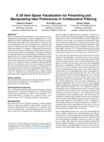
A 3D Item Space Visualization for Presenting and Manipulating User Preferences in Collaborative Filtering
Kunkel, J., Loepp, B., & Ziegler, J. (2017). Proceedings of the 22nd International Conference on Intelligent User Interfaces (IUI ’17), 3–15.
Supporting users in setting effective goals in activity tracking
Herrmanny, K., Ziegler, J., Dogangün, A., & PERSUASIVE 2016. (2016). In A. Meschtscherjakov, B. De Ruyter, V. Fuchsberger, M. Murer, & M. Tscheligi (Eds.), Persuasive Technology: 11th International Conference ; PERSUASIVE 2016 ; Salzburg, Austria, April 5-7, 2016 ; Proceedings (Vol. 9638, pp. 15–26). Springer International Publishing.

3D-Visualisierung zur Eingabe von Präferenzen in Empfehlungssystemen
Kunkel, J., Loepp, B., & Ziegler, J. (2015). Mensch Und Computer 2015 – Tagungsband, 123–132.
Hybreed: A Software Framework for Developing Context-Aware Hybrid Recommender Systems
Hussein, T., Linder, T., Gaulke, W., & Ziegler, J. (2014). User Modeling and User Adapted Interaction, 24(1), 121–174.
Situationsgerechtes Recommending – Kontextadaptive, hybride Empfehlungsgenerierung
Hussein, T., & Ziegler, J. (2011). Informatik Spektrum, 34(2), 143–152.

A framework and an architecture for context-aware group recommendations
Hussein, T., Linder, T., Gaulke, W., & Ziegler, J. (2010). In G. Kolfschoten, T. Herrmann, & S. Lukosch (Eds.), Collaboration and Technology: 16th International Conference, CRIWG 2010, Maastricht, The Netherlands, September 20-23, 2010. Proceedings. Springer.

Context-adaption based on ontologies and spreading activation
Hussein, T., Westheide, D., & Ziegler, J. (2007). In A. Hinneburg (Ed.), LWA 2007: Lernen – Wissen – Adaption.
Maßarbeit statt Konfektion - Kontextadaption liefert passgenaue Informationen
Ziegler, J., Kaltz, W. J., Lohmann, S., & Hussein, T. (2006). Forum Forschung, 42–47.
